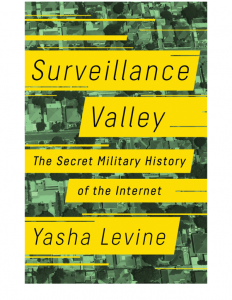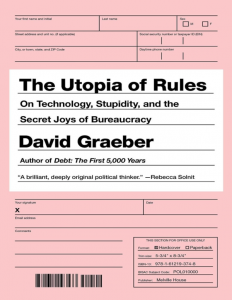Pra quem manja de várias línguas, vou juntar aqui uns livros que parecem interessantes. Alguns eu já li, outros estão na lista.
-
Obfuscation, A User’s Guide for Privacy and Protest, de Fin Burton e Hellen Nissenbaun

With Obfuscation, Finn Brunton and Helen Nissenbaum mean to start a revolution. They are calling us not to the barricades but to our computers, offering us ways to fight today’s pervasive digital surveillance—the collection of our data by governments, corporations, advertisers, and hackers. To the toolkit of privacy protecting techniques and projects, they propose adding obfuscation: the deliberate use of ambiguous, confusing, or misleading information to interfere with surveillance and data collection projects. Brunton and Nissenbaum provide tools and a rationale for evasion, noncompliance, refusal, even sabotage—especially for average users, those of us not in a position to opt out or exert control over data about ourselves. Obfuscation will teach users to push back, software developers to keep their user data safe, and policy makers to gather data without misusing it. -
Surveillance Valley – The secret military history of the Internet, de Yasha Levine (2018)

Despite the emergence of story after story about politically charged email hacks, corporate-security breaches, and secret drone strikes, we still think of the perpetrators as bad actors. Yet as Yasha Levine shows in this bracing book, the truth is simpler. The internet was built to be a weapon, and it’s been getting ever more effective. Since ARPA began building it in the 1960s, internet technology has been synonymous with spying. Levine traces this history, starting with the visionary scientist William Godel, who realized that the key to winning the war in Vietnam was not outgunning the enemy but using new technology to understand and anticipate their movements. As the book spins forward in time, Levine shows that many of the tech-industry giants we think of as social networks, e-tailers, and search companies are doing double duty as military contractors and security outfits. Levine is unafraid to name names: Google, IBM, Facebook, and many others make… -
The Science of Coercion, Communication Research & Psychological Warfare, 1945-1960, de Christopher Simpson (1970)

During the Cold War, a battle raged for control of people’s minds. U.S. military, intelligence and propaganda agencies saw mass communication as an instrument of persuasion and domination. To achieve their goals, they enlisted top professors and universities. The legacy of that relationship between the government and the academy was profound, and it continues today. The academic studies provided an important part of U.S. psychological warfare not just internationally but domestically as well. -
The Age of Surveillance Capitalism: The Fight for a Human Future at the New Frontier of Power, de Shoshana Zuboff (2018)

The challenges to humanity posed by the digital future, the first detailed examination of the unprecedented form of power called “surveillance capitalism,” and the quest by powerful corporations to predict and control our behavior.
The threat has shifted from a totalitarian Big Brother state to a ubiquitous digital architecture: a “Big Other” operating in the interests of surveillance capital. Here is the crucible of an unprecedented form of power marked by extreme concentrations of knowledge and free from democratic oversight. Zuboff’s comprehensive and moving analysis lays bare the threats to twenty-first century society: a controlled “hive” of total connection that seduces with promises of total certainty for maximum profit–at the expense of democracy, freedom, and our human future. -
The Utopia of Rules: On Technology, Stupidity, and the Secret Joys of Bureaucracy, de David Graeber (2015)

Where does the desire for endless rules, regulations, and bureaucracy come from? How did we come to spend so much of our time filling out forms? And is it really a cipher for state violence?To answer these questions, the anthropologist David Graeber—one of our most important and provocative thinkers—traces the peculiar and unexpected ways we relate to bureaucracy today, and reveals how it shapes our lives in ways we may not even notice…though he also suggests that there may be something perversely appealing—even romantic—about bureaucracy.Leaping from the ascendance of right-wing economics to the hidden meanings behind Sherlock Holmes and Batman, The Utopia of Rules is at once a powerful work of social theory in the tradition of Foucault and Marx, and an entertaining reckoning with popular culture that calls to mind Slavoj Zizek at his most accessible.
An essential book for our times, The Utopia of Rules is sure to start a million conversations about the institutions that rule over us—and the better, freer world we should, perhaps, begin to imagine for ourselves. -
Guerras Híbridas, Das Revoluções Coloridas aos Golpes, de Andrew Korybko (2015)

Descrição -
Teoria do Drone, de Gregoire Chamayou (2013, tradução lançada em 2015)

Descrição -
Grassroots for Hire: Public Affairs Consultants In American Democracy, Edward Walker (2014)

Although ‘grassroots’ conjures up images of independent citizen organizing, much mass participation today is sponsored by elite consultants working for corporations and powerful interest groups. This book pulls back the curtain to reveal a lucrative industry of consulting firms that incentivize public activism as a marketable service. Edward Walker illustrates how, spurred by the post-sixties advocacy explosion and rising business political engagement, elite consultants have deployed new technologies to commercialize mass participation. Using evidence from interviews, surveys and public records, Grassroots for Hire paints a detailed portrait of these consultants and their clients. Today, Fortune 500 firms hire them to counter-mobilize against regulation, protest or controversy. Ironically, some advocacy groups now outsource organizing to them. Walker also finds that consultants are reshaping both participation and policymaking, but unethical ‘astroturf’ strategies are often ineffective. This pathbreaking book calls for a rethinking of interactions between corporations, advocacy groups, and elites in politics.
- sem arquivo ainda
-
Propaganda, Edward Bernays (1928)

(Copiado da wikipedia) Chapters one through six address the complex relationship between human psychology, democracy, and corporations. Bernays’ thesis is that “invisible” people who create knowledge and propaganda rule over the masses, with a monopoly on the power to shape thoughts, values, and citizen response.[4] “Engineering consent” of the masses would be vital for the survival of democracy.[5] Bernays explains:
“The conscious and intelligent manipulation of the organized habits and opinions of the masses is an important element in democratic society. Those who manipulate this unseen mechanism of society constitute an invisible government which is the true ruling power of our country. We are governed, our minds are molded, our tastes formed, our ideas suggested, largely by men we have never heard of.”[6]
Bernays expands this argument to the economic realm, appreciating the positive impact of propaganda in the service of capitalism.[7]
“A single factory, potentially capable of supplying a whole continent with its particular product, cannot afford to wait until the public asks for its product; it must maintain constant touch, through advertising and propaganda, with the vast public in order to assure itself the continuous demand which alone will make its costly plant profitable.”[8]
Bernays places great importance on the ability of a propaganda producer, as he views himself, to unlock the motives behind an individual’s desires, not simply the reason an individual might offer. He argues, “Man’s thoughts and actions are compensatory substitutes for desires which he has been obliged to suppress.”[9] Bernays suggests that propaganda may become increasingly effective and influential through the discovery of audiences’ hidden motives. He asserts that the emotional response inherently present in propaganda limits the audience’s choices by creating a binary mentality, which can result in quicker, more enthused responses.[10] The final five chapters largely reiterate the concepts voiced earlier in the book and provide case studies for how to use propaganda to effectively advance women’s rights, education, and social services.[11]
-
The Imagineers of War, Sharon Weinberger (2017)
In The Imagineers of War, Weinberger gives us a definitive history of the agency that has quietly shaped war and technology for nearly 60 years. Founded in 1958 in response to the launch of Sputnik, DARPA’s original mission was to create “the unimagined weapons of the future.” Over the decades, DARPA has been responsible for countless inventions and technologies that extend well beyond military technology.
Weinberger has interviewed more than one hundred former Pentagon officials and scientists involved in DARPA’s projects—many of whom have never spoken publicly about their work with the agency—and pored over countless declassified records from archives around the country, documents obtained under the Freedom of Information Act, and exclusive materials provided by sources. The Imagineers of War is a compelling and groundbreaking history in which science, technology, and politics collide.
- sem arquivo ainda
-
Weapons of Math Destruction, Cathy O’Neil (2017)

Armas de Destruição Matemática (WMD, em inglẽs), da pesquisadoras de dados Cathy O’Neil, oferece uma visão mais cética dos algoritmos, com foco em seus custos e consequências sociais negativas. O’Neil documenta como os algoritmos – WMDs – podem punir os pobres e promover os privilegiados, num círculo que piora as desigualdades de raça e de classe do capitalismo. Por exemplo, acredita-se amplamente, nos Estados Unidos, que prisioneiros não-brancos de bairros pobres têm maior probabilidade de cometer crimes, e também estão mais dispostos a cometer outros crimes e voltar à prisão. Os modelos de reincidência que seguem a tendência de um criminoso condenado a reincidir sugerem que essas pessoas são mais propensas a estar desempregadas, não possuem diploma do ensino médio e tiveram, com os amigos, passagens anteriores pela polícia. Uma outra maneira de olhar para os mesmos dados, contudo, é que essas pessoas vieram de áreas pobres com péssimas escolas e poucas oportunidades. “Então as chances de um ex-prisioneiro que volta ao mesmo bairro ter outra encrenca com a lei é sem dúvida maior do que a de um sonegador de impostos que é solto e volta a um subúrbio frondoso.” Nesse sistema, observa O’Neil, “os pobres e não-brancos são punidos mais por serem quem são e viverem onde vivem.”
Armas de Destruição Matemática oferece vários exemplos inspiradores de como os algoritmos podem ser instalados como uma ferramenta muito poderosa, embora invisível, para dominar a vida cotidiana da pessoas. O livro é melhor escrito do que se pode esperar de um quant. As fontes humanas de O’Neil oferecem material vívido que ilumina histórias de dor e sofrimento infligidas às pessoas por empresas de crédito com as estratégias predatórias de empréstimo alimentadas por algoritmos. A partir de sua experiência como uma pesquisadora de dados, ela revela problemas com a entrada destes em algoritmos e explica como esses problemas podem levar à destruição de comunidades inteiras, desde a avaliação de professores até aqueles que enviam seus currículos à procura de empregos. A organização de O’Neil das experiências de pensamento para imaginar como os algoritmos poderiam informar as táticas da polícia em bairros brancos e ricos e para combater crimes de colarinho branco traz à tona o privilégio e a imunidade de que essas comunidades desfrutam quanto às consequências da pobreza. Ela propõe exemplos de como os algoritmos poderiam ser auditados e mantidos em padrões de responsabilidade. O livro de O’Neil tem muita força, ressaltando os problemas estruturais dos algoritmos como uma tecnologia e a obscena realidade de hoje, em que os ricos ainda são verificados por pessoas, enquanto a vasta maioria é cada vez mais gerida por máquinas.
